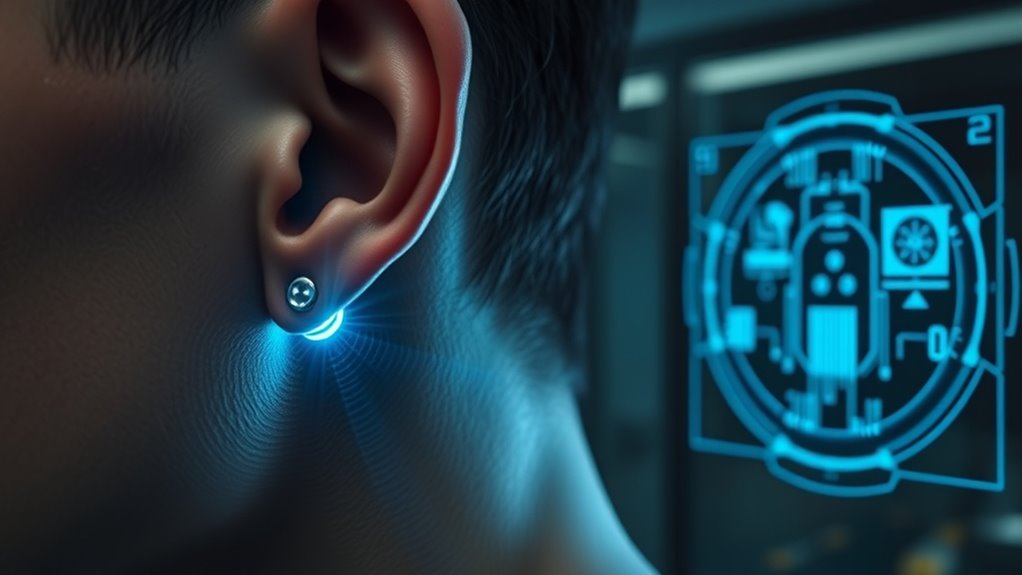Today, technology closely resembles the biblical “mark of the beast” through advances like biometric ID, microchip implants, and digital currencies. These tools enable unprecedented surveillance, tracking your movements, personal data, and financial transactions. While they improve convenience, they also raise ethical concerns about privacy, control, and personal freedom. If you look deeper, you’ll discover how these developments echo ancient prophetic warnings and what they mean for your autonomy and spiritual future.
Key Takeaways
- Modern technologies like biometric ID and microchips enable tracking and identification similar to the biblical mark of allegiance.
- Digital currencies and facial recognition facilitate real-time monitoring, raising concerns about privacy and control.
- Surveillance tools such as data mining and geolocation tracking can erode personal autonomy and anonymity.
- Ethical issues arise from data misuse, breaches, and the potential for increased societal control through technology.
- Spiritual and moral considerations emphasize responsible use, transparency, and safeguarding human rights amid technological advancements.
The Origins of the Mark of the Beast in Prophecy
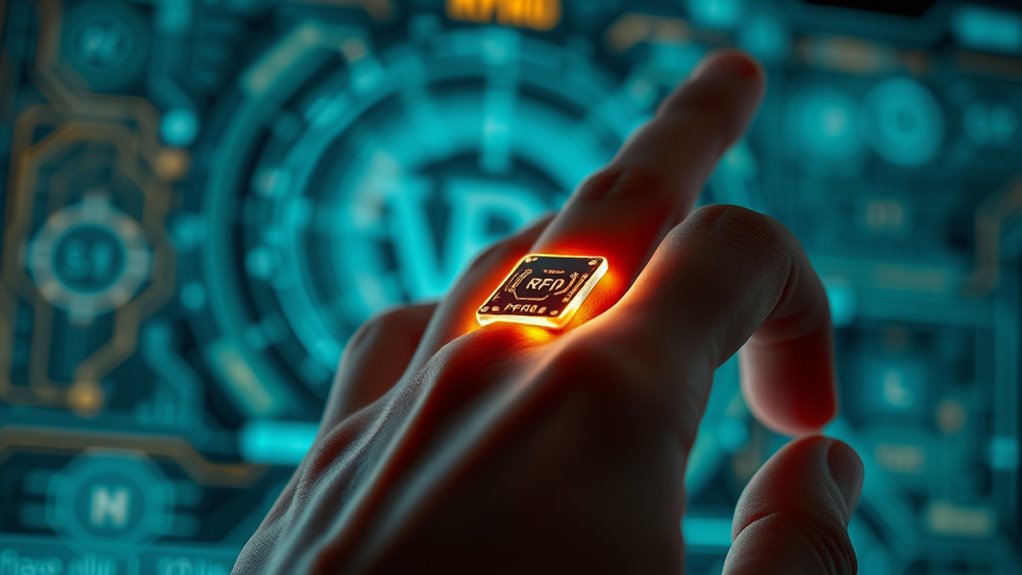
The origins of the Mark of the Beast in prophecy trace back to biblical texts, primarily in the Book of Revelation. This passage uses ancient symbols and prophetic symbolism to convey its message, which has intrigued scholars and believers for centuries. The mark is often associated with loyalty and allegiance, represented through symbols understood in the ancient world. These symbols were powerful tools for conveying spiritual and political messages, making the prophecy rich with layered meanings. As you explore these origins, you’ll see how the imagery reflects concerns about control, identity, and faith. Understanding this context helps you grasp the deep historical and spiritual significance behind the prophecy, which continues to influence interpretations of modern technological developments today.
Biometric Identification and Its Ethical Dilemmas
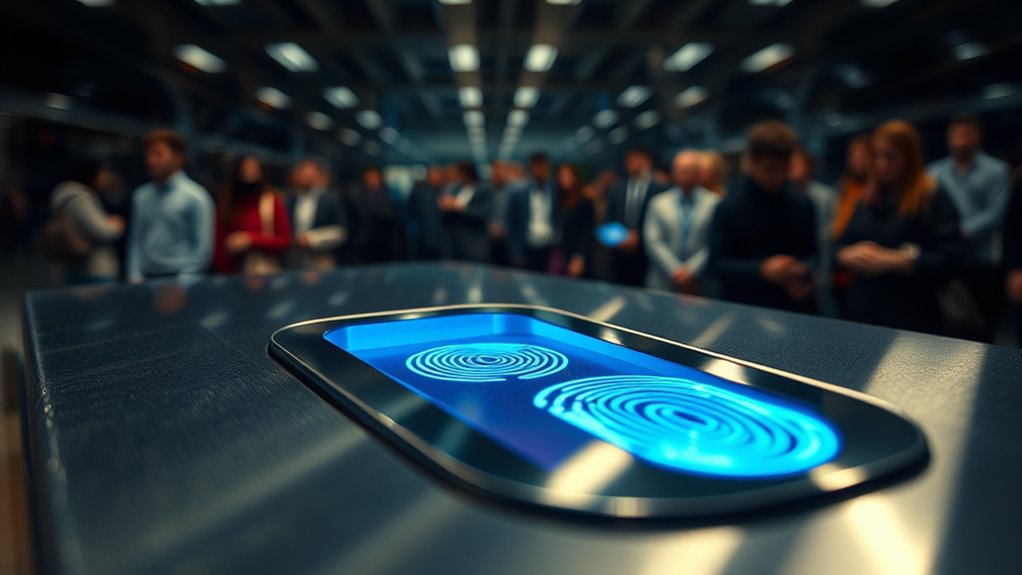
As biometric identification becomes increasingly integrated into daily life, ethical concerns about privacy and security grow more urgent. Facial recognition technology allows systems to automatically identify people in public or private spaces, raising fears about mass surveillance and misuse. Voice authentication provides a convenient way to verify identities but can be vulnerable to hacking or impersonation. You might feel comfortable with these tools, but they also pose risks of data breaches and unauthorized tracking. The collection and storage of your biometric data often occur without full transparency or consent, creating dilemmas about who controls your personal information. As these technologies advance, balancing security benefits with individual rights becomes essential to avoid infringing on privacy and personal freedoms.
Microchip Implants: The Next Step in Personal Data Tracking
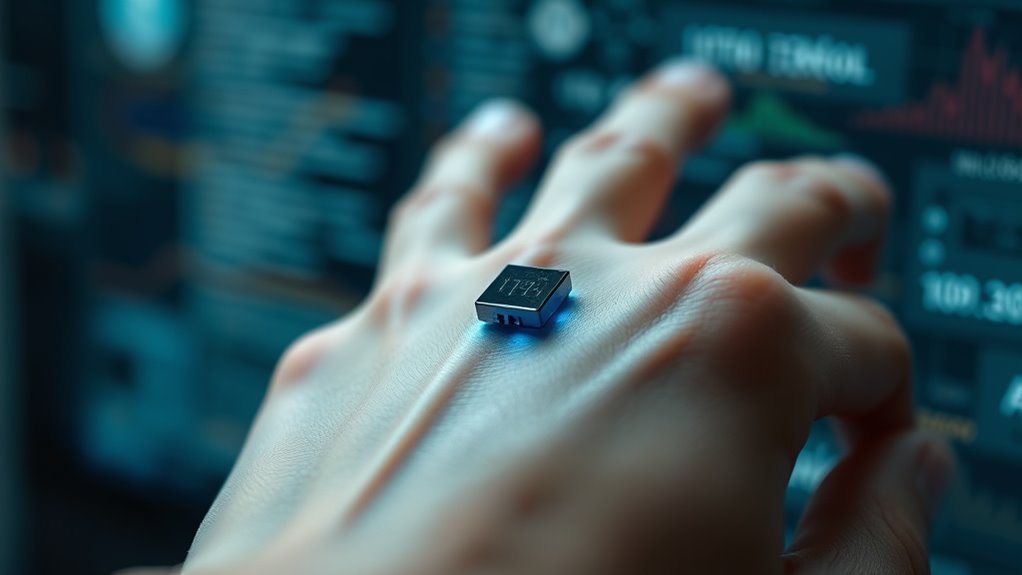
Microchip implants promise greater convenience and accessibility, making everyday transactions faster and simpler. However, they also raise serious privacy concerns, as personal data could be easily tracked or misused. Are the benefits worth risking your privacy for this level of technological integration?
Privacy Concerns Rise
With microchip implants becoming more common, concerns about personal privacy are escalating rapidly. You might worry about who can access your data or how securely it’s stored. Encryption methods are supposed to protect your information, but vulnerabilities still exist. Data privacy issues grow as hackers and corporations could misuse your data. To understand the risks, consider this table:
| Threat | Concern | Prevention |
|---|---|---|
| Data Breach | Unauthorized access | Strong encryption methods |
| Tracking | Loss of anonymity | Limited data sharing |
| Identity Theft | Personal info theft | Regular security updates |
| Surveillance | Government monitoring | Privacy laws and safeguards |
You need to stay vigilant about how your data is protected and what risks come with microchip technology.
Convenience and Accessibility
Microchip implants aim to make everyday tasks more convenient and accessible by allowing you to access information or perform transactions with just a simple scan. With biometric authentication, you can *release* doors, log into devices, or make payments seamlessly. This digital convenience saves time and reduces the need for multiple passwords or cards. You might find yourself:
- Instantly verifying identity without fumbling for keys or IDs
- Making quick payments at stores with a wave of your hand
- Accessing secure areas or devices effortlessly
- Managing personal data securely through embedded technology
While these benefits enhance daily life, they also raise questions about privacy and reliance on technology. Microchip implants promise efficiency but also deepen the integration of personal data into everyday activities.
Digital Currencies and Financial Surveillance

Digital currencies make it easier for authorities to track your transactions in real time, removing much of the privacy you once had. This centralized control allows for seamless monitoring of your financial activity, raising concerns about overreach. As these systems expand, you might find it harder to keep your finances truly private.
Tracking Transactions Seamlessly
Have you ever wondered how your financial transactions can be tracked effortlessly across different platforms? Today, digital currencies and advanced surveillance make this feasible. With retail automation, your purchases are recorded instantly, creating a seamless trail. Wearable technology, like smartwatches and fitness bands, also plays a role by monitoring transactions on the go. This integration ensures your spending habits are continuously monitored without interruption. You might notice:
- Instant transaction updates across devices
- Real-time spending alerts and analytics
- Automated purchase tracking in retail stores
- Enhanced security through biometric verification
This level of tracking makes it easier for authorities to oversee financial activity, raising concerns about privacy. It also helps streamline your financial life, but at what cost? The technology creates a detailed digital footprint that’s hard to erase.
Centralized Financial Control
Centralized financial control has become increasingly prevalent as authorities push for greater oversight through digital currencies and surveillance systems. Governments and financial institutions tighten cryptocurrency regulation to monitor transactions and prevent illicit activities, effectively consolidating power. This growing control favors financial monopolies, allowing them to track every payment and influence economic behavior. By centralizing digital currencies, authorities can implement real-time surveillance, making privacy nearly impossible. You might feel your financial freedom shrinking as your transactions are scrutinized and controlled. Such control creates a digital environment where the state and large corporations dominate, reducing your independence. As centralized systems expand, the risk of misuse increases, raising concerns about privacy, freedom, and the potential for a “mark of the beast” style oversight in financial life.
The Rise of Smart Devices and Constant Connectivity

As smart devices become increasingly integrated into daily life, they create a world where constant connectivity is the norm. You rely on wearable sensors to monitor health and fitness, while smart appliances streamline chores and enhance convenience. This interconnected environment keeps you linked to the internet and your devices at all times. You can:
- Track your health metrics seamlessly with wearable sensors
- Control home appliances remotely via apps
- Receive instant notifications and alerts
- Automate routines for efficiency and comfort
These advancements make life easier but also deepen your dependence on technology. With every device connected, your personal data becomes more accessible—and potentially vulnerable. The rise of smart devices ensures you’re always connected, but it also raises questions about privacy and control in this highly digital age.
Government and Corporate Surveillance Capabilities

In today’s digital landscape, governments and corporations have expanded their surveillance capabilities far beyond traditional methods. They now use facial recognition to identify individuals in crowds and data mining to analyze vast amounts of personal information. This allows them to track your movements, preferences, and even predict behaviors.
| Technology | Purpose | Impact |
|---|---|---|
| Facial Recognition | Identity verification | Increased monitoring |
| Data Mining | Information analysis | Privacy concerns |
| Geolocation Tracking | Movement tracking | Loss of anonymity |
| Social Media Scraping | Behavior analysis | Manipulation risks |
These tools give authorities unprecedented access to your personal life, raising questions about privacy and control.
The Influence of Technology on Personal Freedom
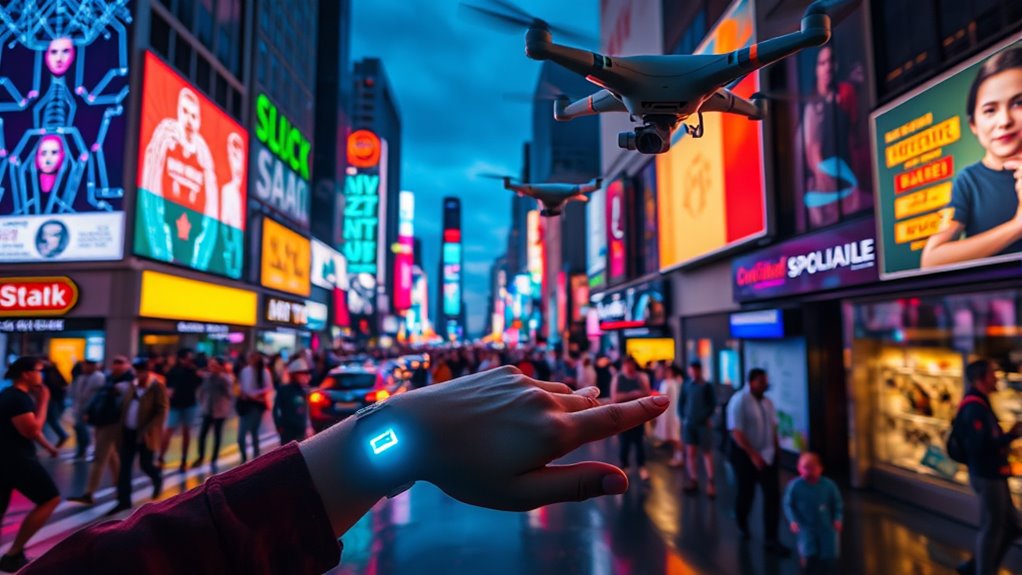
Technological advancements have profoundly impacted your personal freedom, often subtly eroding the boundaries of privacy and autonomy. Surveillance capitalism collects your data to influence decisions, shaping your choices without your awareness. Digital borders now define where your information flows, limiting your control over personal space. This environment makes it easier for corporations and governments to monitor your activities constantly. You may feel free but are often confined within invisible constraints.
- They track your online behavior, shaping your perceptions.
- Digital borders restrict your access to information.
- Your personal data becomes a commodity in surveillance capitalism.
- Privacy becomes a privilege, not a right.
These shifts threaten your individual liberty, turning personal freedom into a controlled experience dictated by unseen forces.
Balancing Innovation With Ethical and Spiritual Concerns

While innovation drives progress and opens new horizons, it also raises urgent ethical and spiritual questions that demand your attention. You must consider the ethical implications of new technologies, ensuring they serve humanity rather than harm it. Spiritual concerns also come into play, as advancements may challenge your core beliefs. To navigate this balance, reflect on how technology aligns with moral values and spiritual principles. Here’s a simple view:
| Ethical Implications | Spiritual Concerns | Possible Actions |
|---|---|---|
| Privacy violations | Loss of faith | Implement strict privacy policies |
| Surveillance misuse | Moral decay | Promote transparency and ethics |
| Human dignity threats | Spiritual disconnection | Foster spiritual awareness |
Balancing innovation with these concerns helps you pursue progress responsibly.
Frequently Asked Questions
How Close Are We to Fully Implementing Biometric-Based Identification Worldwide?
You’re probably wondering how close we are to fully implementing biometric authentication for global identification. It’s happening quickly, with many countries adopting fingerprint, facial, and iris scans for secure access. While some regions lead the way, others still face privacy and infrastructure challenges. Overall, biometric authentication is becoming more widespread, moving us closer to a future where global identification relies heavily on biometric data, but full implementation still has hurdles to overcome.
What Are the Potential Health Risks of Microchip Implants in Humans?
Sure, microchip implants sound futuristic, but they come with health concerns you might want to ignore. Infection risks are real if the implant isn’t sterile or properly maintained. You might think it’s a small risk, yet complications like inflammation or allergic reactions could turn your high-tech upgrade into a health nightmare. So, while innovation is exciting, don’t overlook the potential health risks that could follow.
Can Digital Currencies Be Used to Bypass Government Financial Controls?
You wonder if digital currencies can bypass government financial controls. While cryptocurrency privacy allows for some anonymity, regulations are tightening, making it harder to avoid oversight. Governments are implementing stricter digital currency regulation, tracking transactions more closely. However, if you use decentralized cryptocurrencies, you might find ways to circumvent controls, but risks include legal consequences. Stay informed about evolving laws to protect your financial activities in this digital age.
How Might Smart Device Data Be Used to Manipulate Consumer Behavior?
You might think smart devices just make life easier, but they actually excel at behavioral conditioning. Through targeted advertising and data analysis, they subtly influence your choices, encouraging you to buy more or stick to certain habits. It’s ironic that what feels like convenience can turn into manipulation, as your preferences are shaped without you even realizing it. So, your daily decisions could be less yours than you’d like to admit.
What Legal Protections Exist Against Government Overreach in Surveillance Technologies?
You should know that privacy laws and surveillance oversight are designed to protect you from government overreach. These laws set boundaries on how authorities can use surveillance technologies, ensuring they don’t infringe on your rights. Agencies must follow legal procedures, and oversight bodies monitor their actions. While these protections aren’t foolproof, they provide important safeguards to prevent unwarranted surveillance and misuse of your personal data.
Conclusion
As you navigate today’s tech-driven world, it’s like walking a tightrope over a canyon of endless surveillance and ethical dilemmas. The line between innovation and control blurs faster than you can blink, threatening your personal freedom. Stay vigilant, question motives, and don’t let the march of technology turn your life into a dystopian nightmare. Remember, the choices you make now could shape a future more surreal than any sci-fi story.

